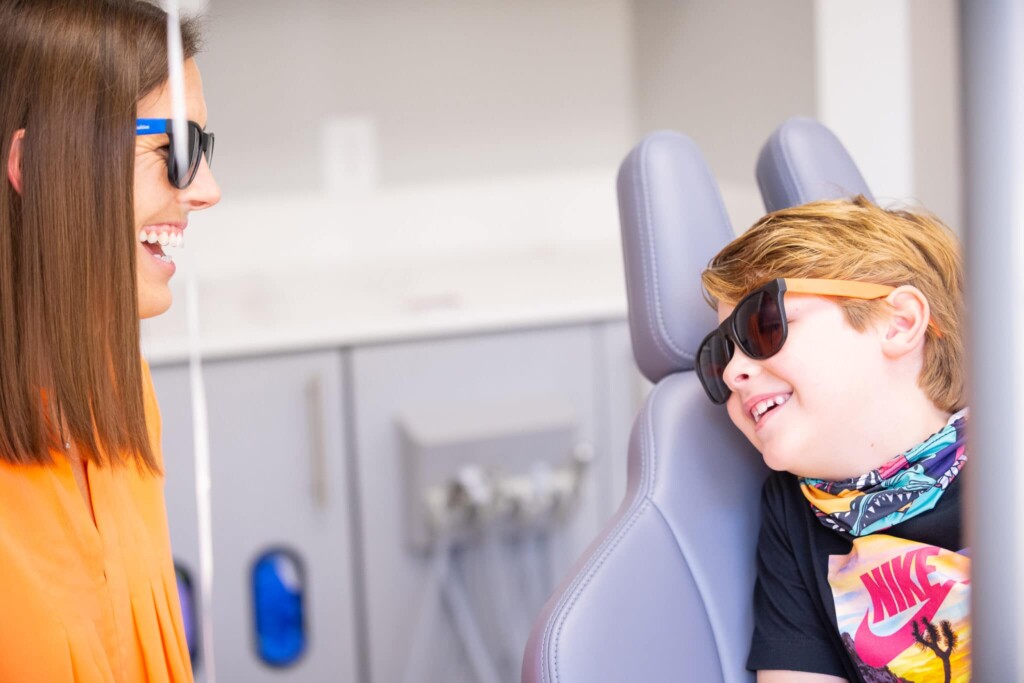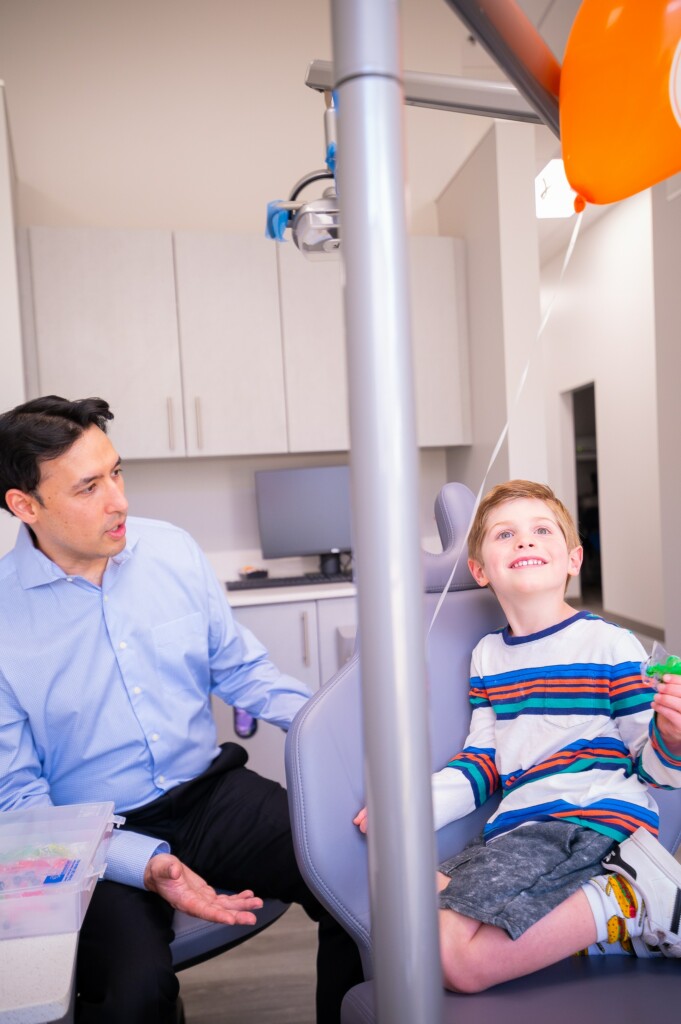Finding the right pediatric dentist is one of the most important decisions you will make for your child. Your child’s first dentist will cultivate a relationship with both of you that will last for years, and that dentist will help teach your child oral hygiene habits that will last a lifetime.
What is a pediatric dentist? Why visit a pediatric dentist vs. a general dentist? Do baby teeth really matter? Woodhill Dental Specialties will answer these frequently asked questions about pediatric dentists and more.
A pediatric dentist has the same training as a general dentist, but they get up to two more years of specialized training in pediatric dentistry. They learn to care for deciduous teeth, also called baby teeth or milk teeth, as well as care for permanent teeth.
Pediatric dentists have specialized training in treating children so they can better address problems that children may not be found in adults, including issues with baby teeth. A children’s dentist will be able to spot early issues, such as a narrow jaw or permanent teeth that aren’t developing properly.
Pediatric dentists also emphasize learning good oral hygiene habits, something all children need at an early age. We know that the earlier children learn good oral hygiene habits, the better the chances they will keep those habits throughout their lives.
Your child should visit the dentist as soon as their first tooth erupts. Digital imaging and X-rays will tell us whether your child’s teeth and jaws are developing as they should. We can also show you how to care for your child’s teeth as soon as they erupt.
Your child should have professional dental cleanings every six months. We will monitor your child’s tooth and jaw development with each dental visit to ensure they have good oral health.

During your first visit to Woodhill Dental Specialties, you will meet our friendly, professional team and tour the office. Your child will meet our doctors as we get to know you and your child.
We will take digital images and X-rays of your child’s teeth and jaws. Don’t worry! Our machines are made to be quick, efficient, and safe. Once we have an idea of your child’s health, we can clean your child’s tooth or teeth. We will show you the best methods for keeping your young child’s teeth clean until their next visit in six months.
Your child should visit the dentist at least twice a year for a professional cleaning and examination. It’s important to see the dentist because oral problems can manifest early. The earlier they’re caught and treated, the better your child’s oral health will be.
In some cases, we may want to see your child every three months. This may be to monitor potential dental problems or help your child better develop good oral hygiene habits.
We’ve been asked before, should I fix cavities in my child's baby teeth? They believe that since they will fall out eventually, filling cavities isn’t necessary. In fact, you should have your child’s cavities filled as soon as possible.
Cavities and tooth decay can spread into the living portion of the tooth and cause infection and pain. Cavities can also cause tooth loss. If the baby tooth is lost too early, other teeth could move and fill the space. This won’t leave enough room for the permanent tooth to erupt, and it may come in crooked.
Baby teeth also help a child learn to speak properly. Cavities could result in tooth loss at a time when your child is learning to speak correctly. This could result in a speech impediment.
How do you brush baby teeth? You begin with water and a warm washcloth for infants. Once they have a few teeth, you can switch to a child-size, soft-bristled toothbrush and a pea-sized amount of toothpaste. You must also teach your child how to floss, even with only a few teeth.
Use the right amount of fluoride toothpaste, and be sure your child learns to spit out the excess toothpaste. You will need to monitor your child’s toothbrushing until about 2 years of age. Too much fluoride at a young age can cause harm, so be sure they spit out the excess.
Usually by age 6, your child should have their oral hygiene habits down well enough that they can brush and floss on their own.

Tooth decay can lead to toothaches in children just as in adults. You need to treat cavities in baby teeth just as you would in adult teeth.
Most people think sugar causes cavities. This is partially true. Sugar metabolizes in the mouth and produces acids that eat away at the minerals in your tooth enamel, which is the hard, protective shell of the tooth.
Other foods can also produce acids and bacteria that eat away at the teeth and lead to cavities. It’s not limited to sugary foods. That’s why it’s so important to brush and floss your teeth daily.
Other conditions can make your child more vulnerable to cavities, including genetic conditions that cause thin enamel or medications that cause dry mouth. Talk with your dentist if you suspect your child may be more vulnerable to getting cavities, gum disease, or other threats to their dental health.
Accidents happen, and your child could lose a baby tooth before the proper time. It’s also possible that a baby tooth falls out before the permanent tooth is ready to erupt.
Contact your pediatric dentist if you suspect your child’s tooth has fallen out too early. In some cases, it’s OK to wait for the permanent tooth to come in on its own. In other cases, we may need to place a spacer in your child’s mouth to keep the surrounding teeth from crowding out the permanent tooth.
The sooner your child starts seeing a dentist, the better their chances of enjoying good oral health throughout their lifetimes. Part of our job at Woodhill Dental Specialties is to build a good relationship with your child so that they feel comfortable visiting the dentist.
Schedule a virtual consult with Woodhill Dental Specialties if you need a children’s dentist in Dallas, TX, or Rockwall, TX. We will treat your child with kindness and care while providing the professional dental services they need to start their journey to a lifetime of great oral hygiene!